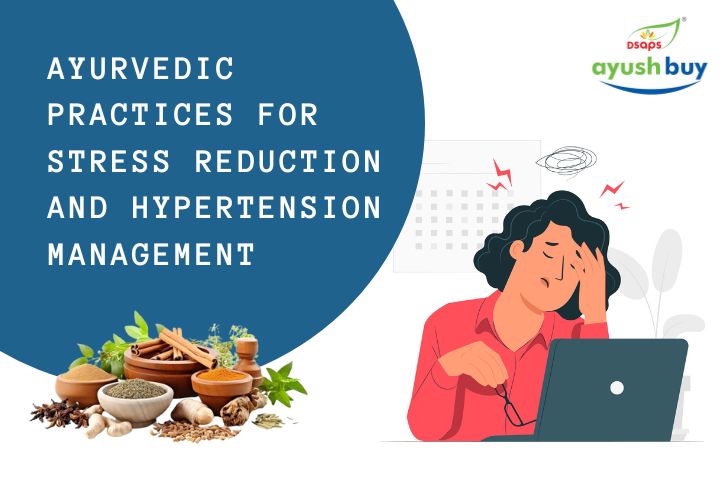Introduction
In today’s fast-paced world, stress has become a common cause of many health issues, including hypertension or high blood pressure. While modern medicine offers effective treatments for managing high blood pressure, many individuals seek alternative approaches rooted in ancient wisdom. While conventional medicine offers various treatments, Ayurveda, the ancient Indian system of medicine, provides holistic solutions for reducing stress and effectively managing hypertension by addressing the root cause through natural remedies and lifestyle modifications.
Understanding Hypertension in Ayurveda
According to Ayurveda, hypertension is often viewed as an imbalance in the doshas, particularly an aggravated Pitha dosha. When Pitha, the principle of heat and transformation, becomes excessive, it can lead to increased blood pressure. Additionally, emotional factors such as stress, anger and anxiety can further aggravate Pitha and contribute to hypertension.
Read: Ayurvedic Approach to Managing High Cholesterol
Ayurvedic Practices for Hypertension Management
Ayurveda emphasizes a holistic approach to managing high blood pressure, focusing on restoring balance in the body and mind. Here are some key Ayurvedic practices for hypertension management:
1. Stress Reduction Techniques
Ayurveda recognizes the impact of stress on blood pressure and advocates for stress reduction techniques such as meditation, yoga and Pranayama (breathwork). These practices help calm the mind, reduce cortisol levels and promote relaxation, thus lowering blood pressure naturally.
2. Herbal Remedies
Ayurvedic herbs have been used for centuries to support cardiovascular health and lower blood pressure. Some of the most commonly recommended herbs for hypertension include Ashwagandha, Brahmi, Arjuna, and Tulsi. These herbs possess adaptogenic and cardioprotective properties, helping to regulate blood pressure and improve overall heart function.
3. Dietary Recommendations
Ayurveda emphasizes the importance of a balanced diet in managing hypertension. Foods that are cooling, soothing, and low in sodium are recommended to pacify Pitha and reduce blood pressure. Incorporating fresh fruits, vegetables, whole grains, and healthy fats while minimizing processed foods and excessive caffeine can help maintain optimal blood pressure levels.
4. Lifestyle Modifications
Making lifestyle changes plays a crucial role in managing hypertension in Ayurveda. This includes maintaining a regular daily routine (Dinacharya), getting an adequate amount of sleep, staying physically active with gentle exercises like walking or swimming and avoiding excessive alcohol and tobacco consumption.
Ayurvedic Medicines for Hypertension or High Blood Pressure
In addition to incorporating lifestyle modifications and stress reduction techniques, Ayurvedic medicines can also be beneficial in managing high blood pressure. Some commonly prescribed Ayurvedic formulations for hypertension include:
- Ashwagandha (Withania somnifera): An adaptogenic herb, Ashwagandha helps the body adapt to stress and promotes overall well-being, including blood pressure regulation.
- Sarpagandha: Sarpagandha, also known as Indian Snakeroot, is a potent herb used in Ayurvedic medicine for its hypotensive effects. It helps relax blood vessels and reduce blood pressure levels.
- Amla / Emblica officinalis helps to reduce oxidative stress, which helps prevent hypertension progression.
Click here for more Ayurvedic Medicine for High Blood Pressure
Conclusion
In conclusion, Ayurveda offers a comprehensive approach to managing hypertension by addressing the underlying imbalances in the body and mind. By incorporating stress reduction techniques, herbal remedies, dietary modifications, and lifestyle changes, individuals can effectively control high blood pressure and promote overall well-being. However, it’s essential to consult with a qualified Ayurvedic practitioner before initiating any new treatment regimen, especially if you are already on medication for hypertension. With dedication and consistency, Ayurvedic practices can serve as valuable tools in the journey towards better cardiovascular health and a balanced life.



